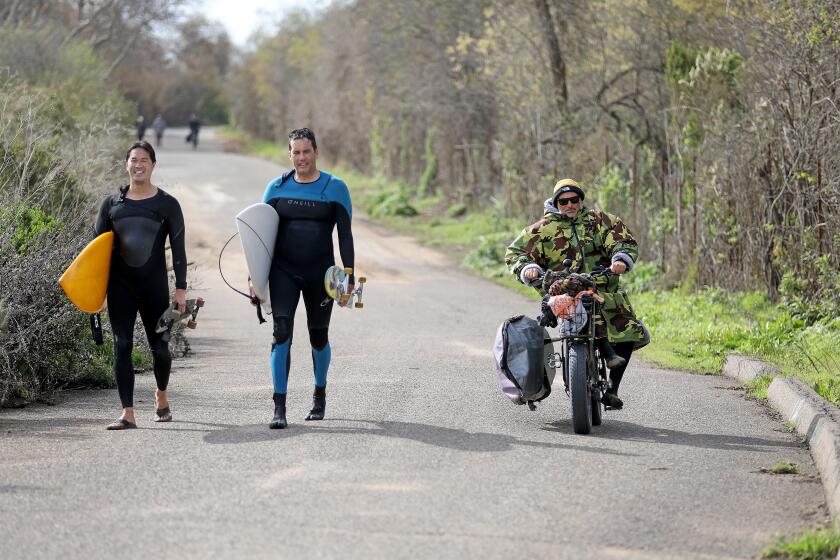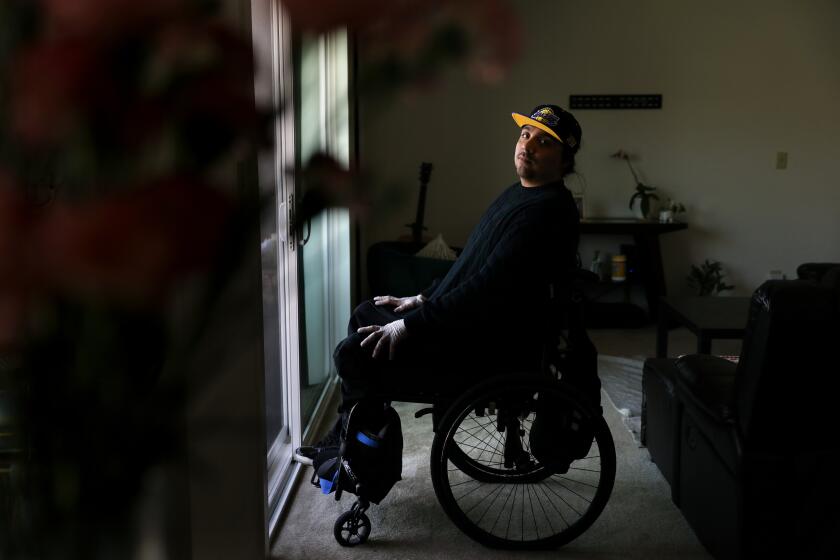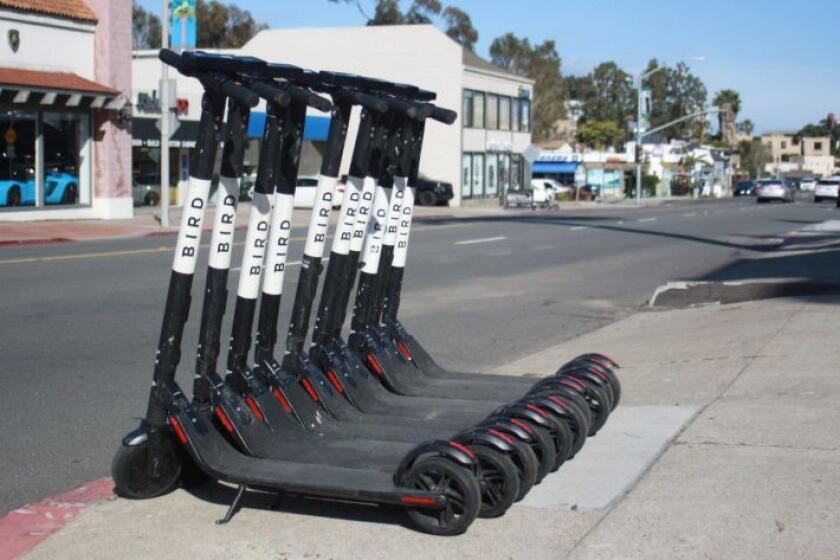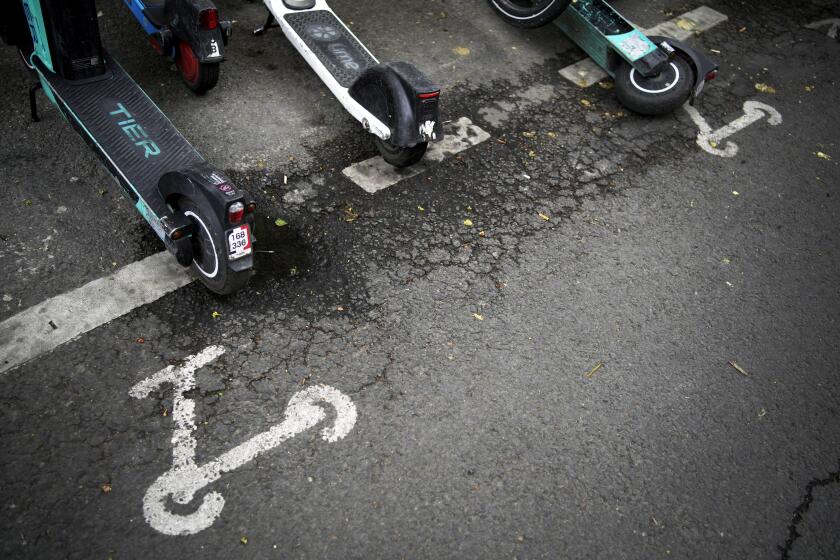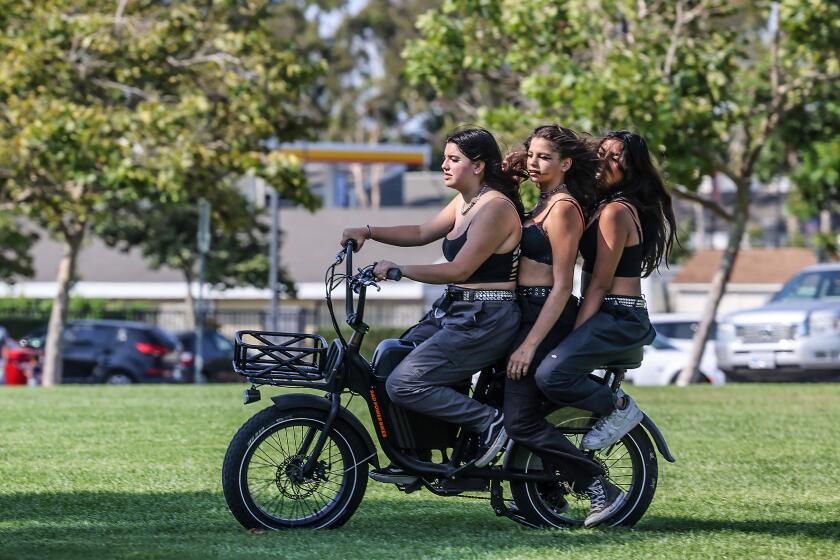Scooter operators say strict rules, rampant theft threaten business in San Diego
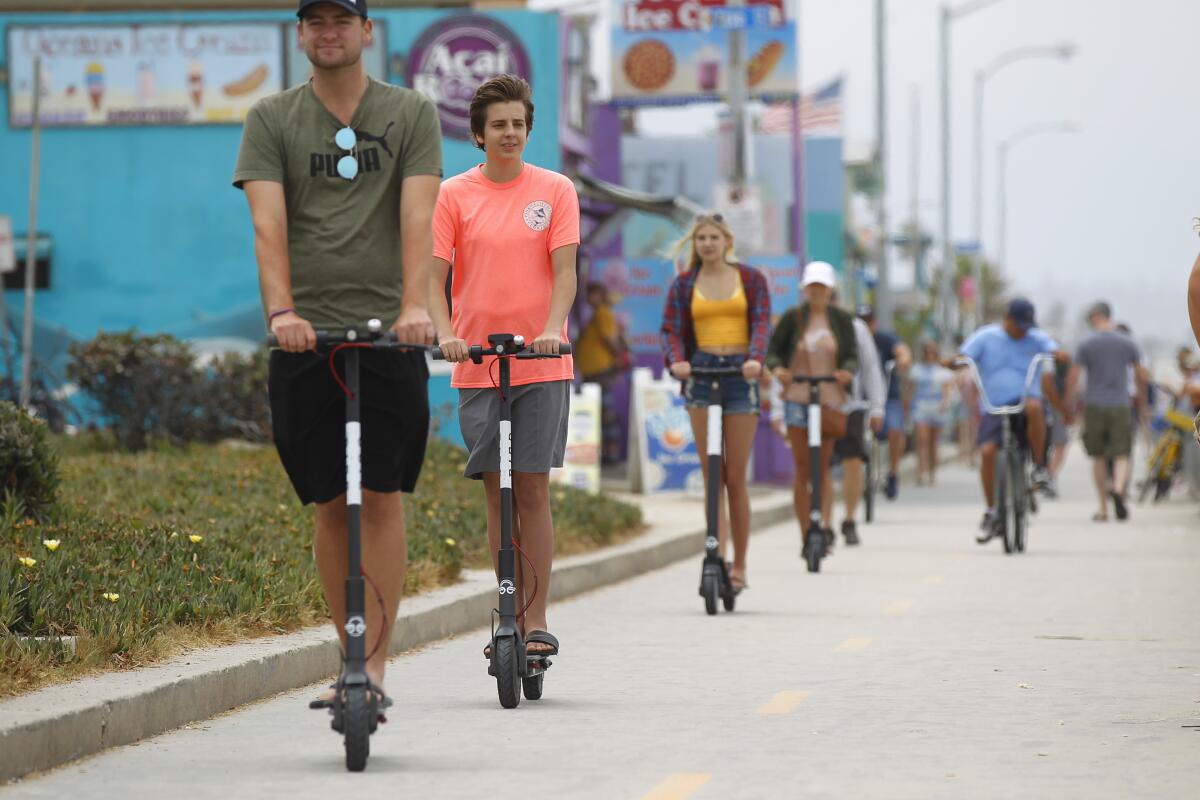
- Share via
SAN DIEGO — Electric scooter companies say their ability to operate in San Diego is being severely hampered by city regulations combined with a sharp rise in scooter thefts that’s being blamed on the proximity to the U.S.-Mexico border.
City officials say a thriving scooter industry is crucial to their climate action plan because scooters can help solve the “last-mile” problem of getting to and from transit, potentially making transit convenient enough for people to give up commuting by car.
San Diego is the only major city in the nation to require something called sidewalk speed throttling, a safety-focused technology that quickly slows scooters down to 3 mph any time they are steered onto a sidewalk.
Scooter companies say the regulation is well intended but too aggressive and arguably ahead of its time.
But a bigger problem, they say, might be thieves targeting scooters that are technologically advanced enough to comply with the rule.
The growing popularity of e-bikes has created a conundrum for Orange County cities as they try to balance state climate goals with concerns about rider and pedestrian safety.
Theft rates have risen so high in recent months that scooter companies are limiting how many of the most advanced scooters they deploy, instead rolling out older, cheaper models that struggle to comply with sidewalk speed throttling.
“San Diego ought to be one of the best markets for scooters because of tourism and the weather,” said Brit Moller, head of public policy for scooter operator Spin. “But the deceleration requirement is jeopardizing the viability of the whole program.”
Some of the older models being deployed in San Diego fail to comply with the sidewalk throttling rule. But more often, they still comply with the rule — only in a way that makes the ride uncomfortable and unpleasant.
“Our ridership is terrible,” Moller said. “It’s at an historic low.”
City officials say they are working with law enforcement to solve the theft problem.
“The binational theft issue is unique to San Diego because not many cities have our high level of tourism and a jurisdiction next door that you can’t enforce upon,” said Alyssa Muto, who oversees scooters as head of the city’s Sustainability and Mobility Department. “We are working diligently with the operators, our Police Department, the Sheriff’s Department and their state and federal counterparts on tackling this issue.”
Moller said that each month thieves steal more than 15% of Spin’s San Diego fleet — about 150 scooters of the roughly 900 the company regularly deploys.
Turns out Bird’s user agreement tries to make riders responsible for their scooter accidents in L.A.
A spokesperson for Bird, the only other company that still operates scooters in San Diego, agreed that binational theft is the No. 1 issue facing the local scooter industry.
If the problem gets solved, Bird is confident scooter companies can deploy the most advanced scooters that comply with San Diego’s regulations and that riders enjoy using, the spokesperson said.
The city’s sidewalk throttling rule is arguably playing a role in the problem by prompting companies to deploy scooters that are the most technologically advanced — and at greatest risk of being stolen.
“Those newer-generation devices with the proficient technology have been stolen, and they are being taken apart over the border for the smart technology,” Muto said.
But she said there are no plans to eliminate or amend the sidewalk throttling rule, which was added to the city’s municipal code when the City Council approved a sweeping scooter crackdown in August.
In addition to the throttling rule, the crackdown requires scooters to be parked in designated corrals and requires operators to handle complaints about their scooters within one hour.
All scooters must be labeled, in 40-point type, with decals that read, “Riding and parking on sidewalks are prohibited.” They also need to display, in 88-point type, a device identification number.
New rules would make operators more accountable and prohibit use on sidewalks and parking outside corrals.
The new crackdown also seeks to curb cluttering of scooters by charging companies based on the number of scooters deployed each day. That’s in contrast to the flat fee the city had been charging under the old model.
Muto said she is optimistic the new package of regulations, including the controversial sidewalk throttling rule, can work moving forward.
“We are hopeful we see international theft decline and that there is a bounce back of operations to the levels we had anticipated under this new program,” Muto said.
The number of scooters deployed on a typical day has plummeted since the new rules took effect, from about 6,500 per day to 3,000 per day.
And only two of the four companies picked to operate in San Diego have followed through. Link has abandoned San Diego, while Lime is still working with city officials on compliance with the sidewalk throttling requirement.
Lime officials say the technology behind sidewalk throttling hasn’t advanced enough for it to be deployed widely by scooter companies, stressing that no other cities require it.
They say that sudden slowdowns can jerk riders awkwardly and that imperfect technology sometimes slows riders who aren’t on a sidewalk but in the middle of a street, putting them in danger.
Parisians have overwhelmingly voted to banish the French capital’s ubiquitous for-hire electric scooters from their streets in a citywide referendum.
Lime has unsuccessfully lobbied the city instead to require scooters to give riders audible alerts when they steer onto a sidewalk.
“We recognize the need to deter e-scooter riders from riding on sidewalks and believe our alert system provides the safest path forward for both pedestrians and riders,” said Charlie Mastoloni, Lime’s senior manager of government relations. “Fine-tuning this rule will ensure San Diegans have the world-class micro-mobility program they deserve.”
Muto said critics exaggerate the drawbacks of speed throttling and the challenges it presents to scooter companies.
“It doesn’t get down to zero, so you don’t get somebody stopping dead in their tracks — it gradually slows down to 3 mph,” she said. “Each of the companies has models in their fleet that meet and even perform superbly with the speed throttling.”
Muto also said the alternatives suggested aren’t viable, contending noise notifications are a nuisance to people nearby and that cellphone notifications distract riders.
But she did concede that speed throttling is unpopular with some riders.
“Part of the thrill of riding a scooter is going fast and feeling the wind in your hair and getting from one place to another quickly,” she said.
E-bikes can make bicycle commuting easier and are growing in popularity. Here are some safety considerations, particularly for young riders.
Muto stressed that the new rules are a compromise between responding to vocal complaints about scooters and still allowing the devices to become a popular way to get around.
“We’re pretty pleased with the regulations at this point,” said Muto, acknowledging that some fine-tuning may still be needed. “We’re having very open conversations and collaboration with both the operators and the public to understand where those pinch points are.”
Janet Rogers, leader of a local scooter watchdog group called Safe Walkways, said scooter companies prompted the city to adopt such an aggressive rule by exaggerating their own technological advances.
“Ever since the scooter companies got here, they have bragged that they could use technology to control these devices,” she said. “And now they say sidewalk detection is impossible.”
Rogers also criticized city officials for what she said is lax enforcement of scooter rules, contending the older models don’t comply with sidewalk throttling and that many local scooters don’t have proper hand brakes or warning decals.
City officials said feedback from the public about the new regulations has been mostly positive.
Marcella Bothwell, chair of the Pacific Beach Community Planning Group, said residents in her neighborhood are pleased that scooters no longer get parked on sidewalks.
“There has been noticeable improvement,” she said. “The city seems to be on the right track.”
More to Read
Sign up for Essential California
The most important California stories and recommendations in your inbox every morning.
You may occasionally receive promotional content from the Los Angeles Times.
